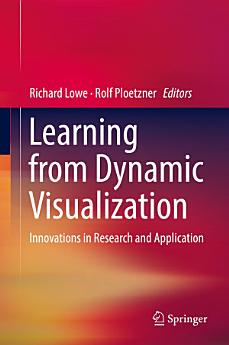Learning from Dynamic Visualization: Innovations in Research and Application
About this ebook
The volume has recruited international leaders in the field to provide diverse perspectives on the dynamic visualizations and learning. It is the first comprehensive book on the topic that brings together contributions from both renowned researchersand expert practitioners. Rather than aiming to present a broad general overview of the field, it focuses on innovative work that is at the cutting edge.
As well as further developing and complementing existing approaches, the contributions emphasize fresh ideas that may challenge existing orthodoxies and point towards future directions for the field. They seek to stimulate further new developments in the design and use of dynamic visualizations for learning as well as the rigorous, systematic investigation of their educational effectiveness.the volume="" sheds="" light="" on="" the="" complex="" and="" highly="" demanding="" processes="" of="" conceptualizing,="" developing="" implementing="" dynamic="" visualizations="" in="" practice="" as="" well="" challenges="" relating="" research="" application="" perspectives.
About the author
Richard Lowe is Professor of Learning Technologies at Curtin University, Australia. After undergraduate studies in science, he worked as an industrial chemist, science educator and textbook writer then completed a Ph.D. in Educational Psychology at Murdoch University, Australia. His research focuses on the effectiveness of explanatory graphics with a particular emphasis on learner processing of complex technical animations. He has a special interest in how the findings from such research can be applied to improving the design of dynamic graphics used not only within educational settings, but also across society more generally.
Rolf Ploetzner received a Ph.D. in Psychology from the University of Freiburg, Germany, where he specialized in cognitive and educational psychology. Across his research career, he has participated in various research projects at the University of Freiburg, the Learning Research and Development Center (LRDC) at the University of Pittsburgh (U.S.A), and the Knowledge Media Research Center (KMRC) in Tübingen, Germany. Since 2002 he has been a Full Professor of Media in Education at the University of Education in Freiburg. In his current research he focuses on strategies for learning from dynamic and interactive media.






